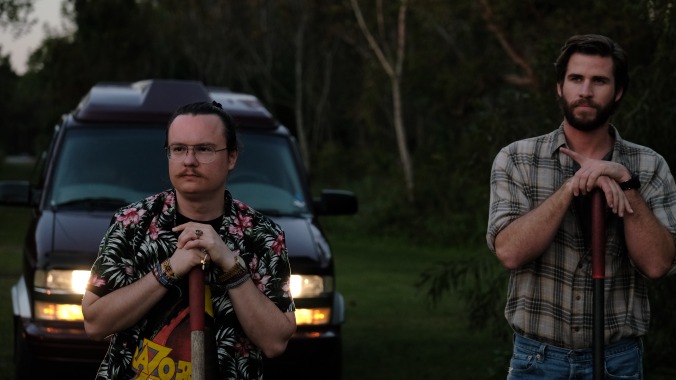Say this for Clark Duke: The Arkansas-born actor and writer looked to the right influences for his directorial debut. Based on a John Brandon novel, the country-fried crime picture Arkansas has its narrative roots in the elevated pulp of Elmore Leonard and Jim Thompson, and its cinematic roots in the darkly comic, casually violent films of Quentin Tarantino and the Coen brothers. The movie never quite rises to the level of its inspirations, however. While Arkansas is a promising and often very entertaining first feature, Duke doesn’t combine these borrowed ingredients—excellent though they are—into a fully realized original story, with its own personality.
The one obviously personal touch is Duke’s use of his home state. The movie opens with a low-level, low-ambition “Dixie Mafia” drug-dealer named Kyle (Liam Hemsworth) getting a new and potentially more lucrative assignment in Little Rock, where he’s been asked to transport a load to Corpus Christi alongside a likable, fast-talking hipster named Swin (played by Duke), under orders from a mysterious, unseen kingpin known as “Frog.” (Pretty much everybody in this movie has a kooky name.) The new partners don’t even make it across the Texas border before they’re waylaid by a park ranger named Bright (John Malkovich), who tells them he also works for Frog, and that from now on they’ll be operating out of his state park, picking up product from a supplier who calls herself “Her” (Vivica A. Fox).
In the nearly two hours that follows Arkansas’ admirably quick setup, Duke and his co-screenwriter, Andrew Boonkrong, jump back and forth in time—reaching as far back as the mid-1980s—and hop across the state, with extended sequences set in West Memphis, Pine Bluff, and Hot Springs. Duke knows and apparently loves these spaces: the Piggly Wiggly grocery store, the lakeside houseboat, the no-frills topless bar, the fireworks wholesaler, the strip mall pawn broker, the antique shop in the middle of nowhere, and all the other places where Arkansans can do more or less what they want without the authorities butting in.
Divided into five chapters, Arkansas is at its strongest in chapters two and four, which recount the origin of Frog, a charismatic salesman (played by Vince Vaughn) who ended up in the drug trade almost by accident, learning at the feet of the sage, cool-headed Almond (Michael K. Williams). At the start of the film, Kyle says that in his experience, organized crime isn’t all that organized, and that, “Relying on other people is the fastest way to end up dead.” But the movie’s two long flashbacks suggests that even an illegal business works best when there are codes of conduct and a commitment to loyalty.
The main problem with the flashbacks? Vaughn and Williams are so exciting to watch that when Hemsworth and Duke return to the screen, they look meager by comparison. Kyle and Swin make an entertaining pair when they’re first introduced, but their part of the plot—which involves Swin sneaking around with his non-criminal girlfriend, Johnna (Eden Brolin), while he and Kyle try to keep Frog from finding out about a couple of accidental murders—never becomes as tense or as urgent as it should be. Arkansas is trying to show that the choices these characters make echo each other across the generations, and speak to a deeper moral rot in their lives. But next to Frog and Almond, the movie’s actual protagonists seem like lightweights. When they’re at center stage, the film sputters a bit.
That said, the performances in Arkansas—including Hemsworth’s and Duke’s—are excellent across the board. And the script features some wonderfully old-school hardboiled dialogue, like when Her says she likes boys like Kyle and Swin, “Who don’t get hung up on having a long life.” It’s clear that Duke is going for something here, with his opening epigraph from novelist Charles Portis (a fellow Arkansan) and his soundtrack filled with wiggy Flaming Lips covers of classic country songs. He’s tapping into old Southern gothic artistic traditions, and illustrating how the culture has evolved and warped. It’s refreshing to see an indie neo-noir with something to say. If Duke gets another shot behind the camera someday—and he should—here’s hoping he can say more of it in his own voice.



 Keep scrolling for more great stories from The A.V. Club.
Keep scrolling for more great stories from The A.V. Club.